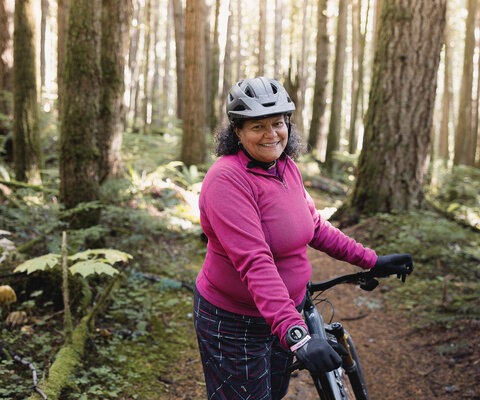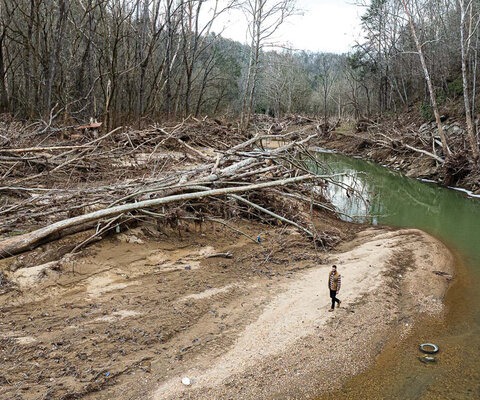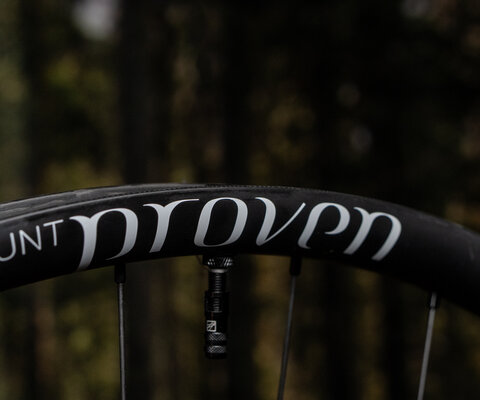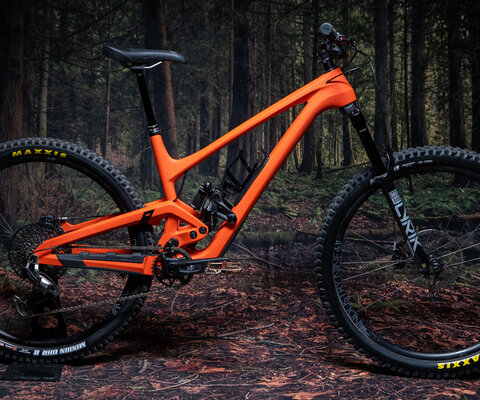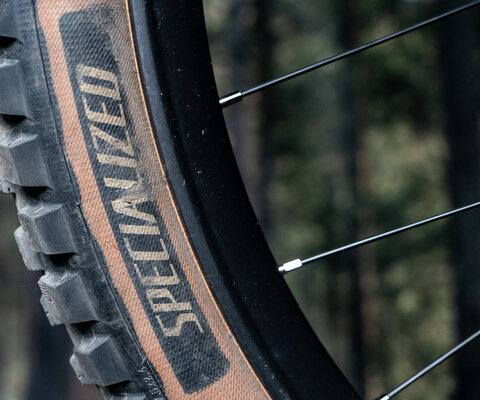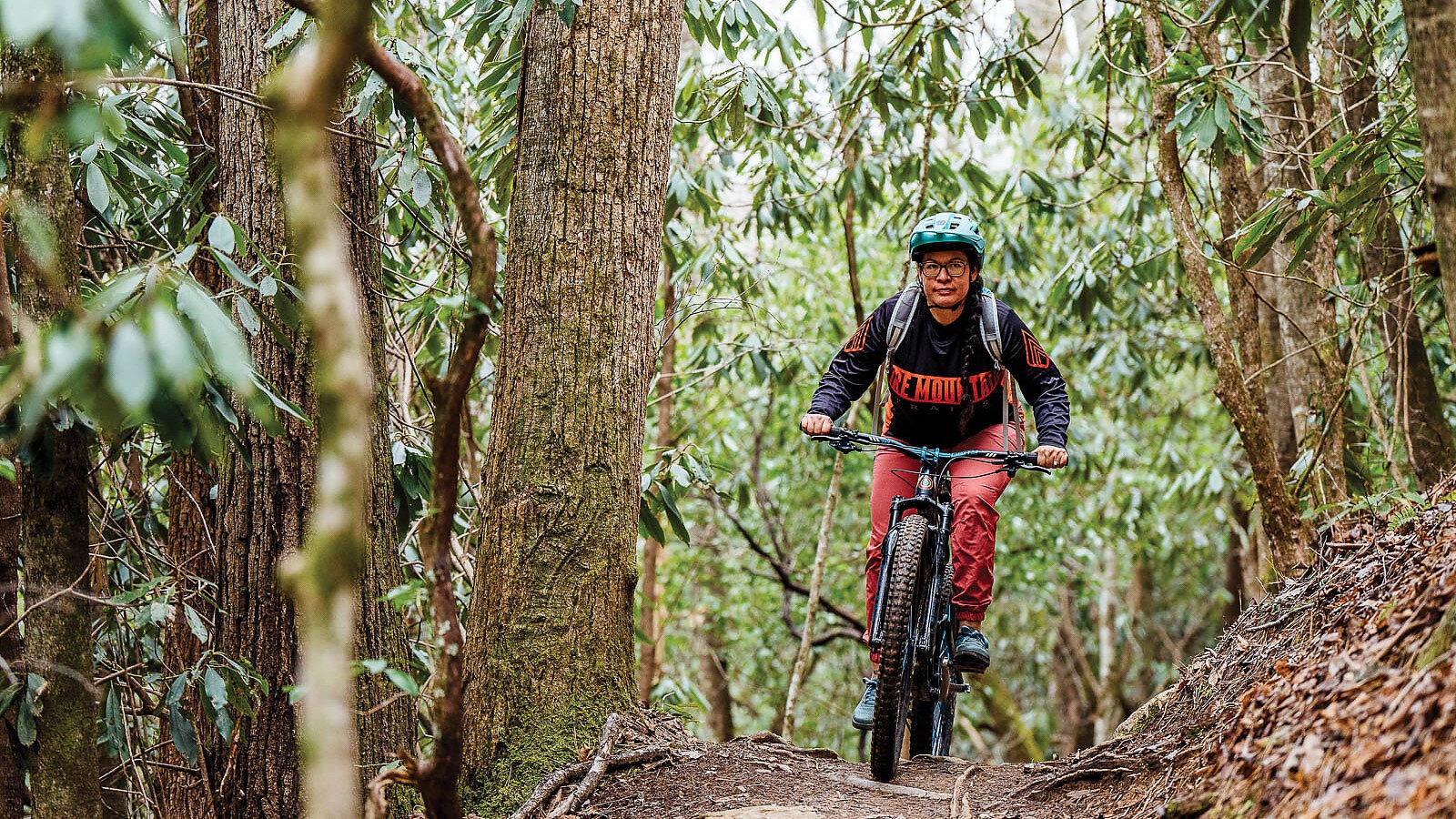
The Right Path Laura Blythe and the Freedom to Be Whole
Words by Kristian Jackson | Photos by Derek DiLuzio
Laura Blythe speaks with a feisty mountain drawl. Her boisterous voice echoes generations of her southern Appalachia forbearers. Today, she calls her bike friends together as they reluctantly eye the snow moving across Soco Gap toward Fire Mountain in western North Carolina. Not one to sugarcoat anything, Laura encourages her comrades.
"Y’all, it’ll be OK,” she says. “We just gotta get movin’.”
The crew reluctantly pulls at zippers and cinches up sleeves, listening for a little more inspiration. Grabbing her sticker-laden Stumpjumper, Laura shouts out while leading up the trail: “It doesn’t matter how slow we are, let’s get goin’.”
Laura has only been riding for four years, but she rallies her group with the grace of a seasoned guide. Despite her newness, she has gone all in—building her skills, her community, and her sense of self. On her journey into mountain biking, Laura has learned to heal complex generational trauma, lead a community, and become a more whole person. Her secret? Follow the right path.
Laura, a mother of two teens and wife to her husband of 20 years, lives next door to where she grew up as a child. Her family’s modest house resembles most in Cherokee, North Carolina, a small rural town on the banks of the Oconaluftee River in the Qualla Boundary—the reservation of the Eastern Band of Cherokee Indians. Just down the street stands the massive high-rise of Harrah’s Cherokee Casino Resort. Beyond that, kitschy storefronts create a frontier façade for tourists. At the street’s end, the southern gateway to the Great Smoky Mountains National Park welcomes people to the Southeast’s gem of biodiversity. It’s an eclectic scene and, for Laura, it was a great place to be a kid.
As a child and member of the Eastern Band of Cherokee Indians, she wandered the creeks and wrestled hard with her brothers, often winning the battles.
“She doesn’t take much gruff from anyone,” says Larry Blythe, her dad. "She’ll hold her own with her ‘get ‘er done’ attitude.'"
Laura’s childhood grit found an outlet in basketball. Through it, she learned the value of athletics, friendship, and teamwork. Life for her looked much like it did for any kid growing up in rural Appalachia. Cherokee’s history extends further than nearly every other Appalachian town.
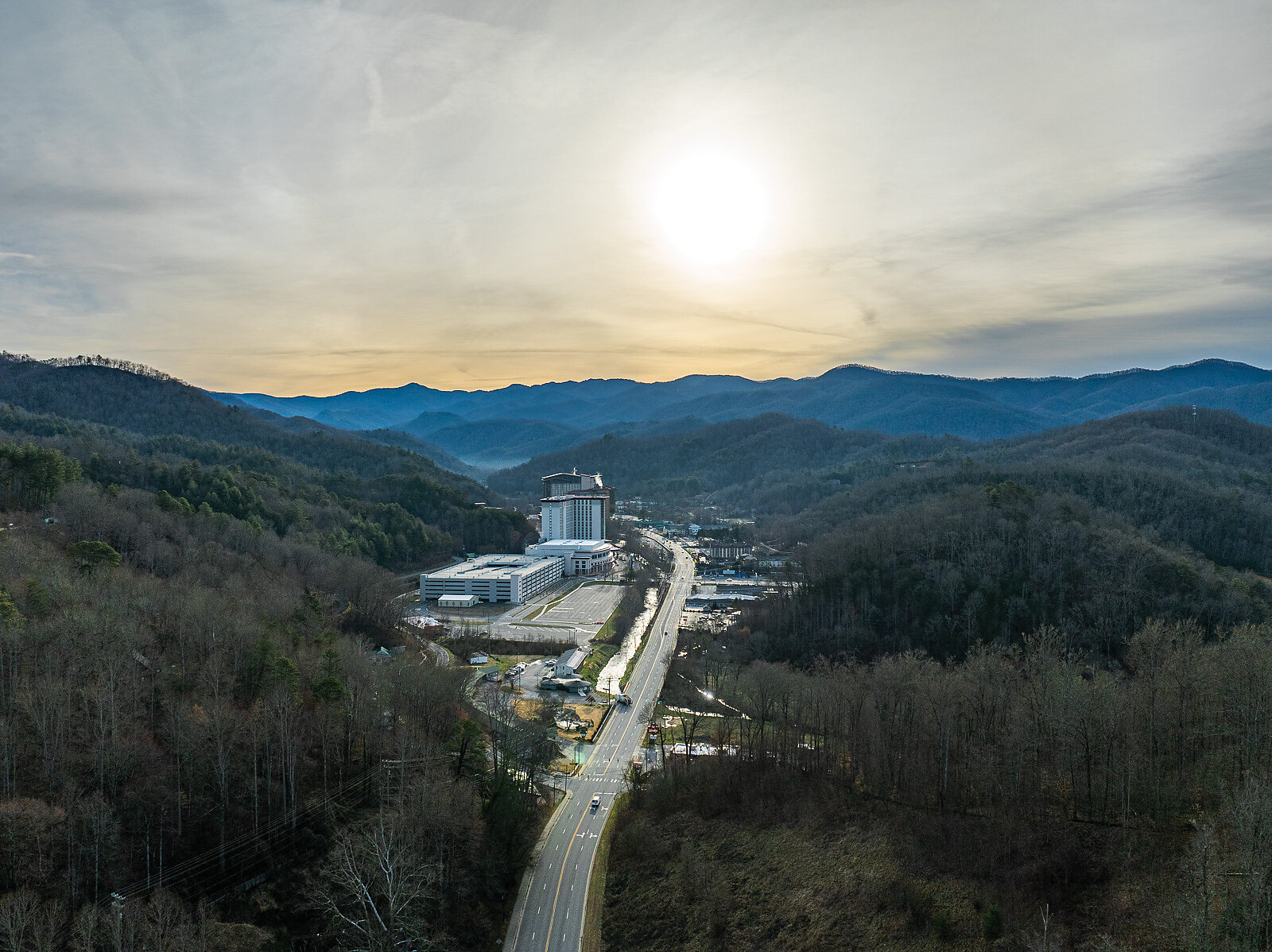
The Eastern Band of Cherokee Indians occupy a sovereign nation within the boundary of North Carolina. The path to sovereignty began in the early 1800s with the Trail of Tears, the forced displacement of the native people of the Southeast. Most of the Cherokee were made to walk from North Carolina to Oklahoma, where they would live out their lives on a reservation.
Some had to denounce their citizenship, while others fled to shelter among the deep coves of the southern Appalachians to escape the removal. Those who remained eventually became the Eastern Band of Cherokee Indians.
Cherokee, the town, would become the capital of their self-purchased Qualla Boundary, their reservation. Laura knew as a kid that Cherokee wasn’t a typical small town.
“Growing up here, you hear the stories, you know,” Laura says. “It’s a little different here, but you don’t know why. We just had a saying, ‘We grew up on the Rez.’”
Even though Laura grew up on the “Rez,” and even though her dad had been a Vice-Chief in the tribe, she did not grow up learning about her culture.
“Growing up in our household, I didn’t speak the language,” Larry says. “Her mom didn’t speak the language. Yes, we lived in Cherokee, but at that time the tribe had not put much emphasis on language or culture.”
As a teenager, Laura began working as a guide at the Oconaluftee Indian Village—a museum of the ancient Cherokee people. Working there planted cultural seeds that, along with mountain biking, would eventually take root.
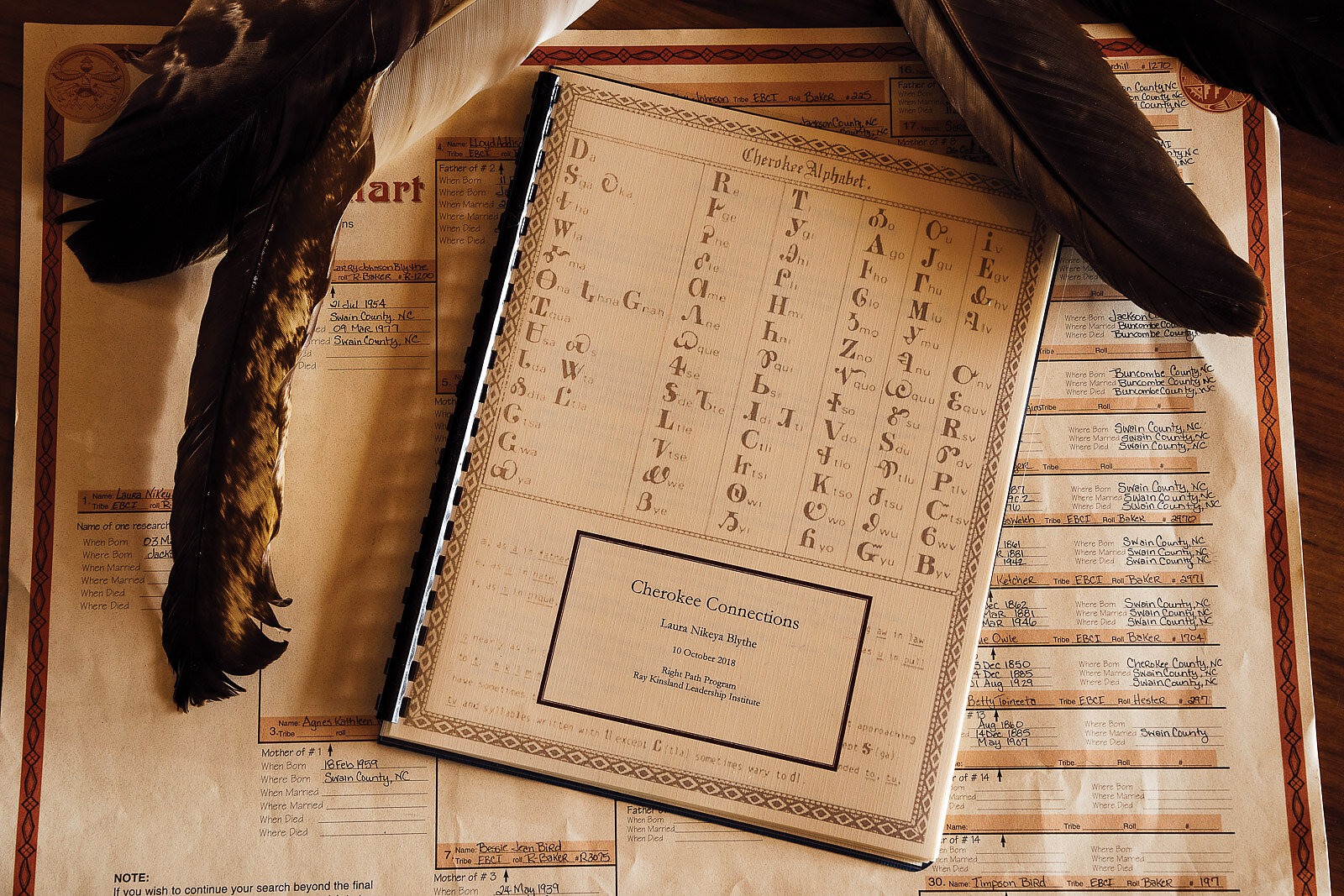
Laura eventually became Director of the Cherokee Historical Association and manager of the Oconaluftee Indian Village. One day in 2017, she noticed bike-laden cars passing outside her office window. Unbeknownst to her at the time, the tribal government had invested in a comprehensive mountain bike trail system. The newly opened Fire Mountain Trails were a stone’s throw from Laura’s office and represented the flagship portion of an ambitious plan to bring mountain biking to the community.
“We had health issues in our community like diabetes and obesity and we saw trails as a new outlet to better health and quality of life for the tribe,” says Jeremy Hyatt, a former tribal secretary and director of Fire Mountain Trails. “The tribe hoped the trails [could] be another attraction for visitors.”
The influx of bikes inspired Laura to give mountain biking a try. Recalling her childhood of playing outside and riding bikes to friends’ houses, she rented a bike and took it for a spin on the flat Oconaluftee River Trail to see if she remembered how to ride.
“I guess the saying is right,” Laura says, remembering that ride. “It is just like riding a bike. I was out of shape, but I don’t like getting defeated. My competitive nature is ‘You’re gonna get this, you’re not weak, you can do this.’”
Laura persevered through those early rental rides and embraced the balance of two wheels. She bought a $500 Specialized Rockhopper and began to make solo excursions to the punchy climbs and rhythmic downhills of the Fire Mountain Trails. No one was teaching her in those early excursions—it was trial by fire and each ride resulted in crashes and bruises.
“I hated it, absolutely hated it,” Laura says. “It was so hard. But I was like, this will not defeat me. I will conquer this.”
“She’s a tough woman,” says Mike Ramos, Laura’s husband. “Laura’s always been on her own path. She tried to get me into mountain biking, but I was reluctant. I didn’t have a mission. She did. She had a mission.”
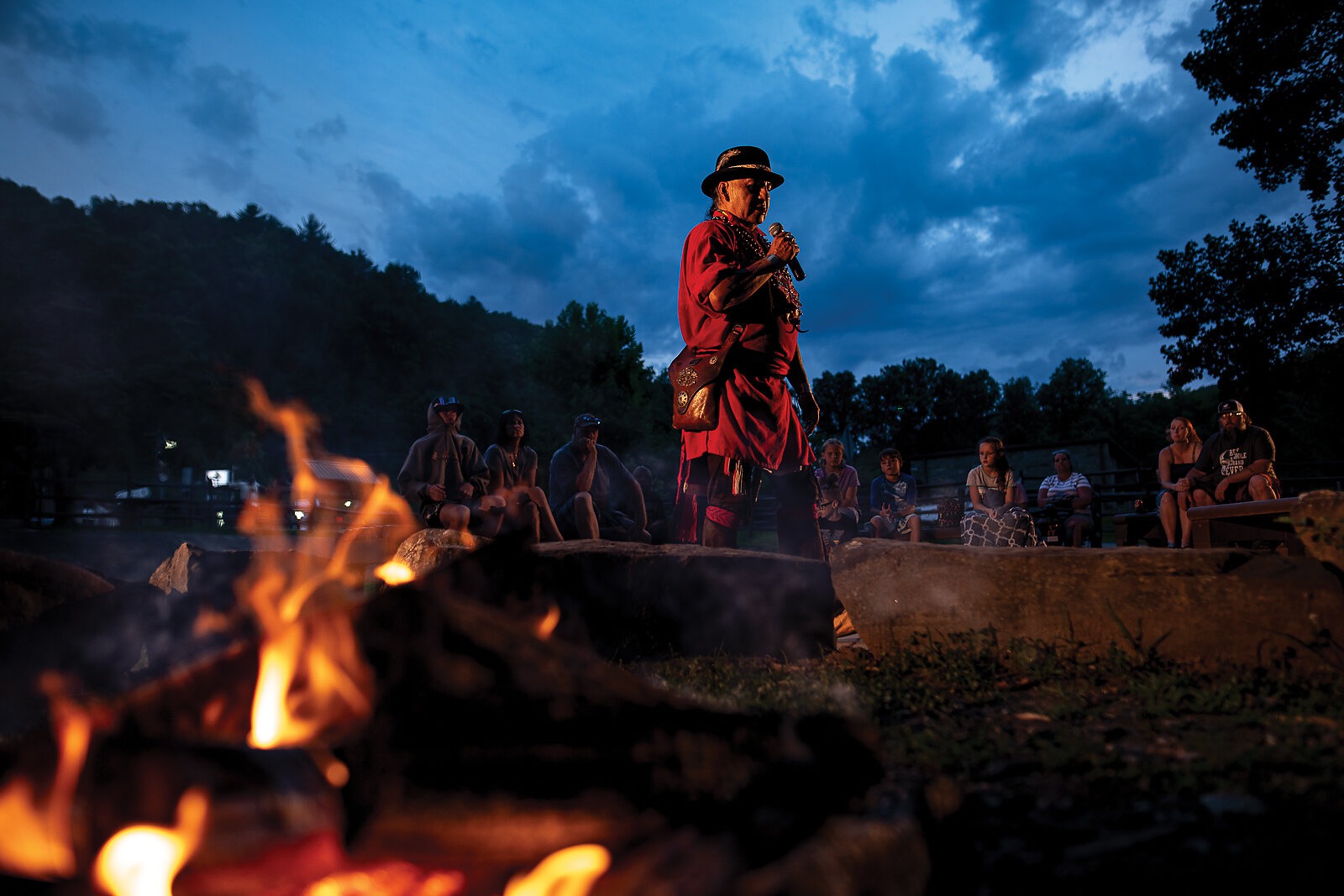
With equal parts stubbornness and naivety, Laura stuck with riding. Slowly, as her bike skills improved, she began to experience something beyond the suffering: a keen sense of balance and peace.
“When you go ride, you don’t have time to think about anything other than staying on the trail or getting up this hill. It gives you a break from that every day—the monotony, the boredom, the stress, the anxiety,” Laura says. “It’s done wonders for me. I’m not gonna lie, I’ve had anger issues my entire life. Riding just makes me a happier person.” Laura’s genealogy chart traces her ancestors back by generations. In researching her past, she has formed deeper connections within herself and come to better understand her own place in the world.
Less than a year into riding, Laura’s friends lured her to Spencer Gap, a more difficult trail over the Blue Ridge Mountains in the Pisgah National Forest. She recalls struggling to the top of a climb just in time to see her friends donning armor and full-face helmets.
THERE ARE SO FEW NATIVE VOICES IN THE SHOW SUPPORT FOR THE FEW WHO ARE MAKING WAVES AND PROVIDING REPRESENTATION FOR NATIVE PEOPLE."
—Laura Blythe
“And there I was in a beat-up helmet and a tank top.” Realizing she didn’t fully appreciate what was about to happen, she said to herself, “I’m going to die today.”
Laura dodged destruction on that classic descent and came out on the other side, fired up to find more trails and take friends along with her. Emra Arkansas, a close childhood friend, was one of them. “She calls it ‘dirt therapy,’” says Emra. “If there’s something on your mind, Laura would say ‘you can work it out on the trail.’” Laura dodged destruction on that classic descent and came out on the other side fired up to find more trails and take friends along with her. Emra Arkansas, a close childhood friend, was one of them. “She calls it ‘dirt therapy,’” says Emra.
“If there’s something on your mind, Laura would say ‘you can work it out on the trail.’” Before long, Laura had talked her dad into trying some dirt therapy as well. “I hadn’t been on a bike in 40 years,” Larry says. “My wife had passed and Laura said, ‘Pops, you gotta get out.’ I was like, ‘What am I going to do?’ ‘You can ride,’ she said. In a lot of ways, she brought me out of that depression, that grief. When I hit that first pedal stroke, I was like, ‘yeah, this is freedom.’”
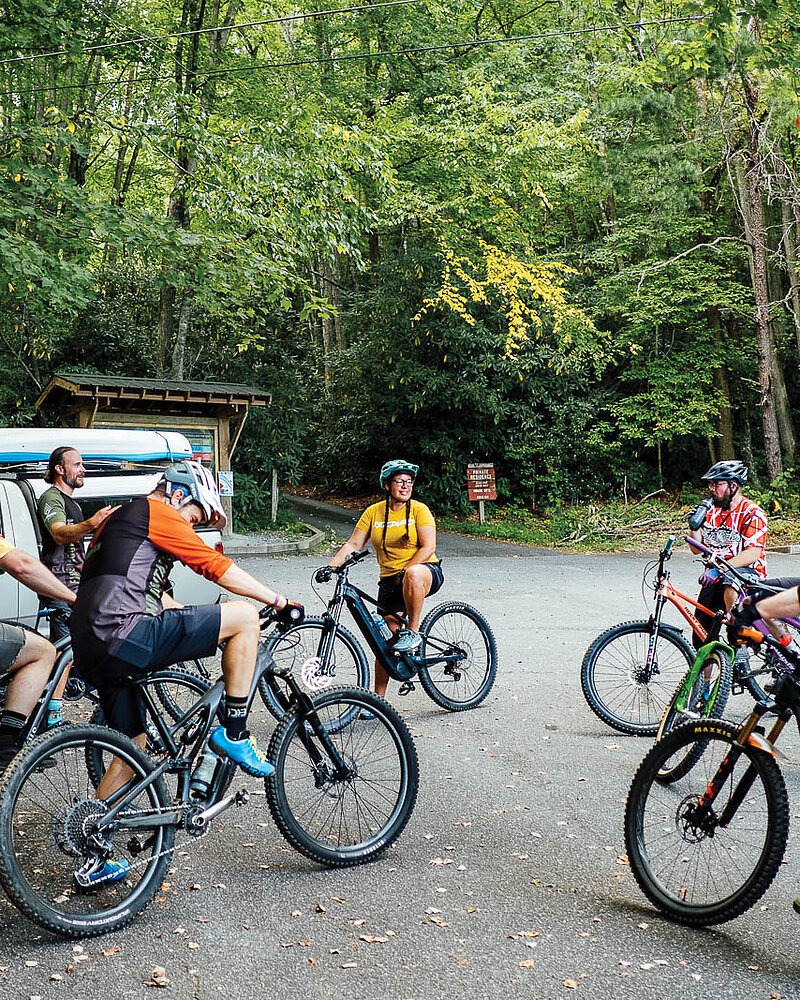
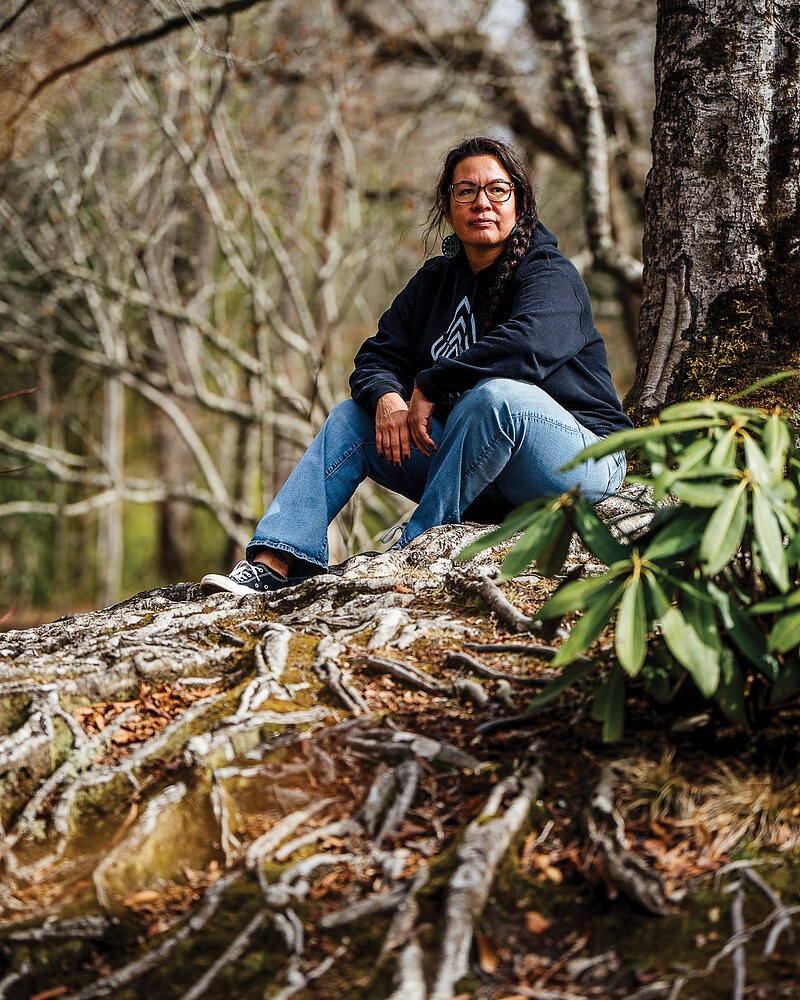
As Laura’s passion for mountain biking ignited, she became aware of the national events, festivals, gatherings, and clinics scene. Empowered by BIPOC scholarships, she hit the road to learn from new trails, expand her skills, and meet mountain bike compatriots. Bit by bit, Laura transformed from an adult with a new hobby to a full-fledged mountain biker. The people she met on the bike inspired her to keep going.
“Everybody in this mountain biking community is so passionate about their craft,” she says. “That has made me fall more in love with it.” Finding inspiration in her travels, she attended many signature community events—Roam Fest, Knoxville’s Fall Festival, and the Sedona Mountain Bike Festival were all waypoints on Laura's journey. But a trip to Rezduro in an RV with her dad and Emra solidified a direction for her. Laura’s dad had been following her adventures on social media and asked her if she had anything particularly interesting coming up. Laura had been excited to hear about the Diné (Navajo) movement with mountain biking, so together, they planned to fly out, rent an RV, and race the Rezduro.
“It was several days of enjoyment,” Larry says. “Laura didn’t know if she could do the race event.” With some encouragement from her dad, she finished the race. “Watching her face just beam made the whole trip worth it.”
The community made Laura beam as well. “There are so few native voices in the mountain bike world, and I wanted to show support for the few who are making waves and providing representation for native people,” Laura says. “The spirituality and the connection to culture are strong at Rezduro. I was 2,000 miles from home but felt at home. Each native tribe has its customs, traditions, stories, and beliefs, but there are so many similarities in practices no matter what rez you’re from.”
Connecting to a larger community had the added benefit of seeing her home through a new lens. For Laura, this meant looking inward, to the deepest parts of her Cherokee self, besides being that ‘kid on the Rez” who didn’t know she was different. Inspired by the mountain bike community, Laura dug into the darker corners of the past. As she searched deep within herself and learned more about her culture, she began to understand and believe that knowing where you came from is key to becoming whole.
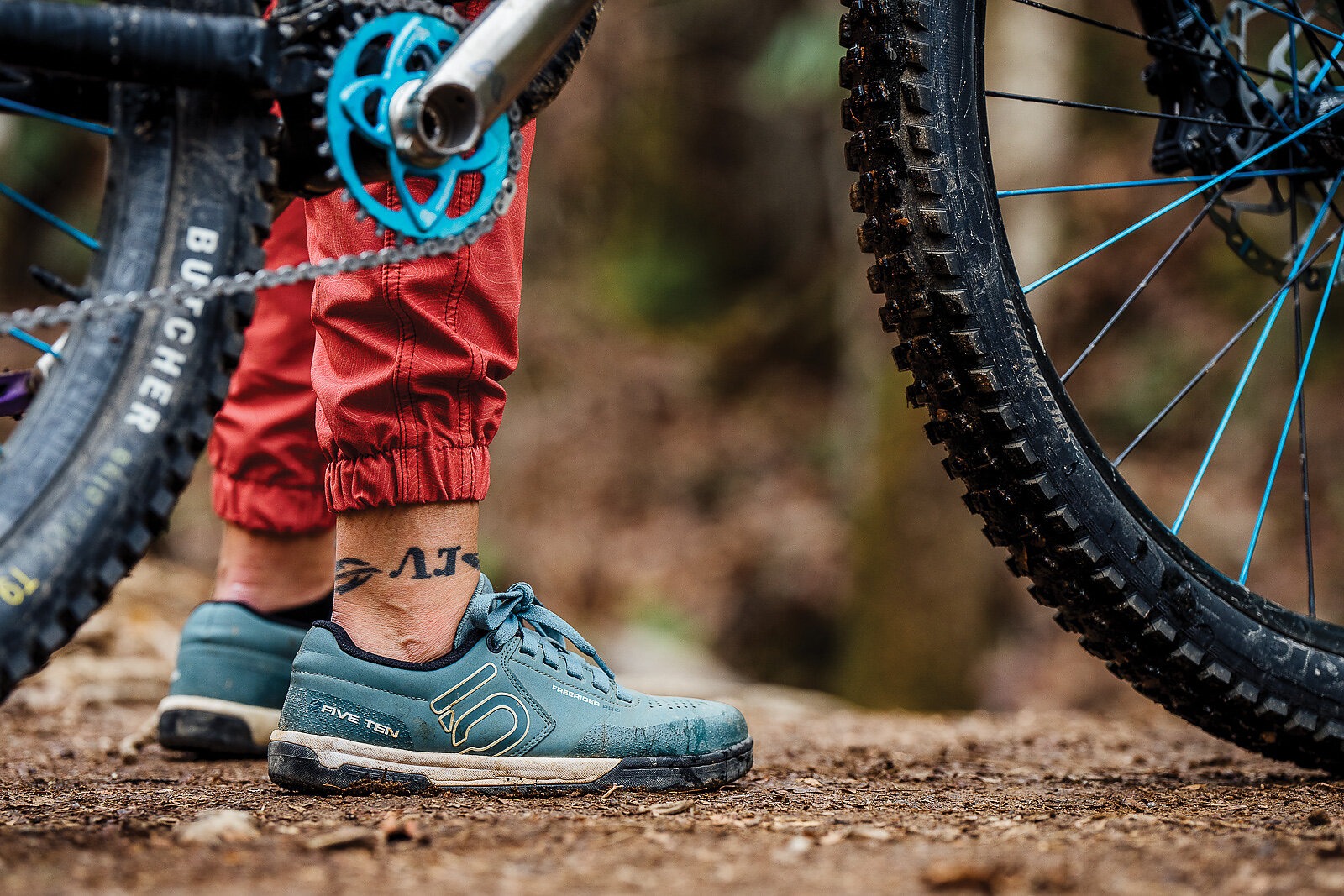
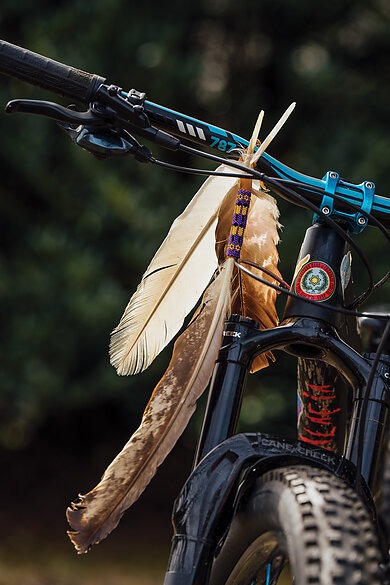
The Cherokee people suffered unspeakable losses at the hands of manifest destiny. The Trail of Tears destroyed families and villages and separated people from their homeland. The injuries, however, did not end there. Even though the remaining Cherokee in North Carolina negotiated and purchased their reservation, the U.S. federal government began a policy of sending tribal children to boarding schools. These children included Laura’s great, great-grandparents. Here began the process of cultural assimilation. European practices, haircuts, clothes, and language replaced all vestiges of Cherokee culture. Generations of Cherokee stopped speaking their native language.
“I’m one generation removed,” Laura says. “My grandpa went to boarding schools. My dad didn’t have a relationship with his dad because of the toxic environment and abuse that was passed down. My grandmother, who’s non-native, took him and his brothers out of that situation. Alcoholism runs in our family background. I’m very proud of our dad for breaking that cycle later in life because he almost died the same way his father did.”
This forced assimilation led to a broad generational gap in language, Laura says. Punishment was inflicted on those who spoke their native language, so the natural reaction for many Cherokees was to shield and protect younger generations from that same abuse. That cultural shielding had further implications that rippled through families and communities. The coping mechanisms people use to deal with the pain and loss—alcohol, drugs, violence, anger—all exacerbate and perpetuate the problem. In turn, what one generation passes on to the next is not culture, history, and language. It is trauma.
Laura experienced much of her early life through the filter of this trauma—physical, emotional, and sexual abuse and the residue of alcoholism. The result for Laura was an anger that rippled through her life.
“We’re just now discovering that these are mental health issues,” Laura says. “You don’t know you have it until somebody discusses it or opens your eyes to it. And then you’re like, ‘Oh, wow! That’s what it is.’”
“Multi-generational trauma is an ongoing situation of pain that never breaks free because it gets passed on,” says Dr. Tom Belt, a Cherokee scholar and tribal educator. “It is learned. It was inflicted a long time ago and continues today because it hasn’t been healed.”
For Laura, it has taken years to get to a place of healing. Her path, in this regard, has been one of gradual growth, while never letting trauma stand as an excuse. At first, mountain biking gave Laura an outlet for her anger. But this feeling has evolved over time.
“If I had anger or something on my mind, on my heart, I could go be angry on the side of a mountain, and by the time I got done, I wasn’t angry,” she says. “I can feel that the anger is just kind of not there anymore, like there’s a healthy, productive outlet.”
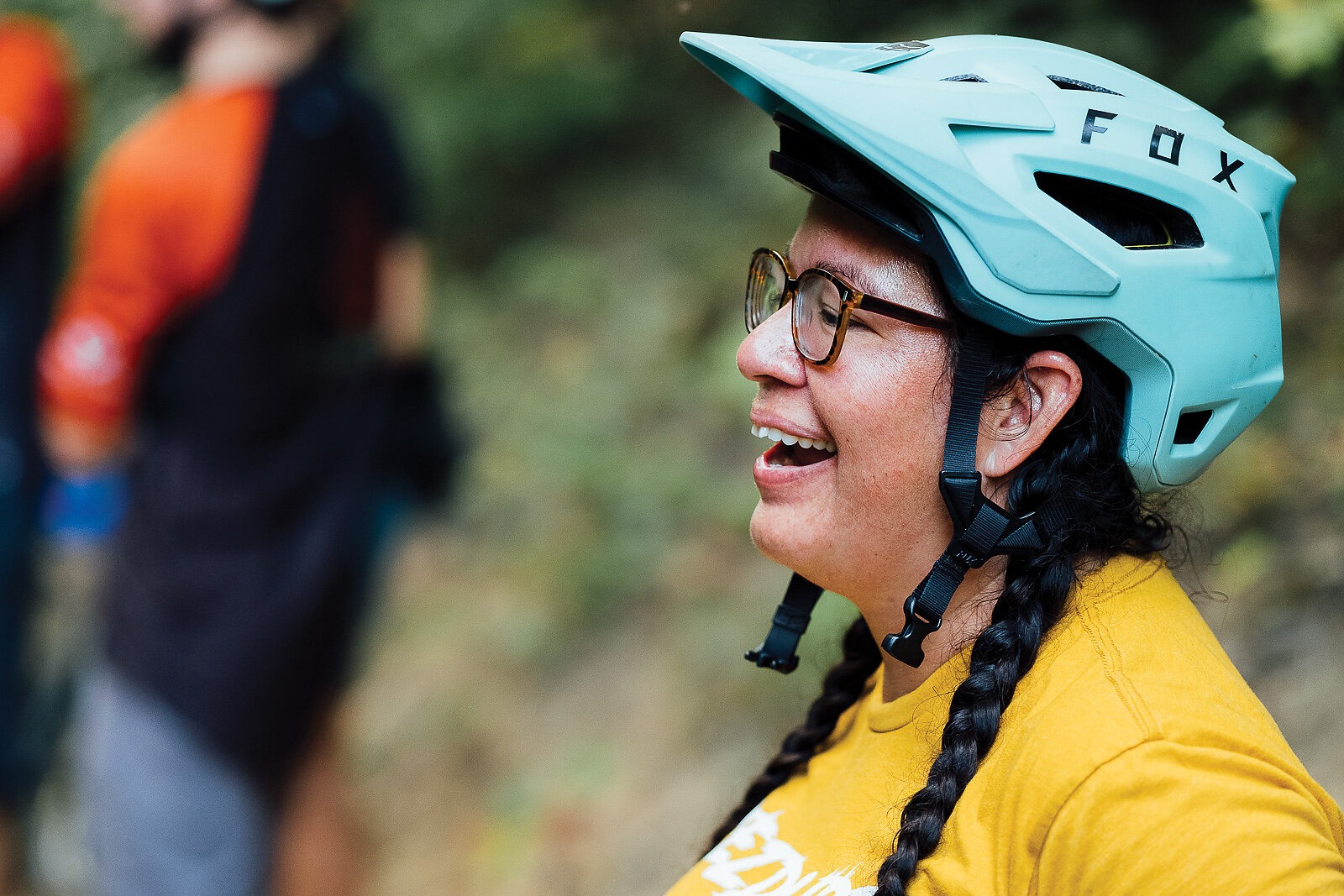
In 2018 Laura participated in a Cherokee adult leadership program called the “Right Path.” This workshop series, led by Dr. Belt, focused on lessons taught to the tribe for thousands of years.
“We’re a people primarily concerned with sustainability,” Dr. Belt says. “If you realize you are a living part of this world, you have a responsibility to it. We try to understand things, not control them, and teach this to the next generation so that life can go on.”
The Right Path is a way of living where actions arise out of values to create balance between an individual, their needs, the needs of family and community, and the needs of the environment.
For Laura, the Right Path represented a missing link in the narrative that connected her culture to that of the historical tribe. As she studied with Dr. Belt, she began to understand Cherokee principles as a source for understanding the world, as well as for taking action in it. Four of the principles became foundational for her: A sense of peace, a sense of place, a sense of purpose, and a sense of productivity. Of those, a sense of peace became central.
“IF I HAD ANGER OR SOMETHING ON MY MIND, ON MY HEART, I COULD GO BE ANGRY ON THE SIDE OF A MOUNTAIN, AND BY THE TIME I GOT DONE, I WASN’T ANGRY.”
—Laura Blythe
“I think that’s the hardest one for anybody to find as an individual,” Laura says. “As long as you’re being productive and purposeful in everything that you’re doing, that sense of peace will find you just knowing that you’re doing a good job and extending kindness. Make sure that you don’t take more than you give back. That gives you your sense of peace.”
Learning to ride a mountain bike as an adult almost defeated Laura. It also instilled a deep personal satisfaction, a connection to the community, and a sense of peace. She knew the next step: Give back by leading others along the Right Path teachings.
Inspired by the benefits of mountain biking, she hatched a mountain bike program for new women riders. She wrote and received grants to fund bikes and certifications, secured local support, and rallied six women co-leaders to help her with the program. The program, called “7 Moons MTB”, starts with a flat trail ride alongside Kituwah and aims to equip novice riders with the community and skills to enjoy riding and reap its benefits. The eventual goal is to ride all of Fire Mountain, the hometown trail that almost broke Laura. Through her inspiration and motivation, Laura’s program is at its capacity.
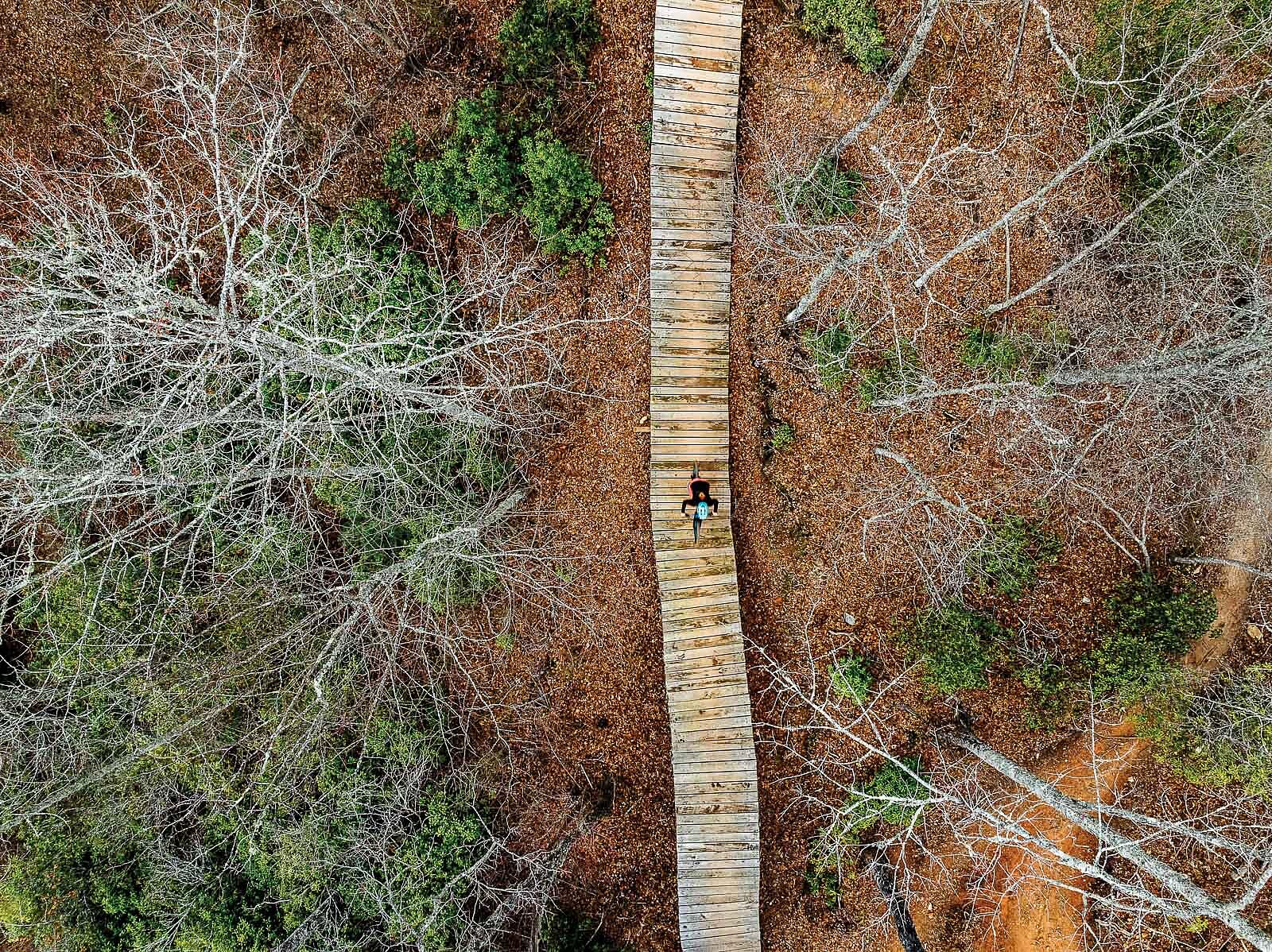
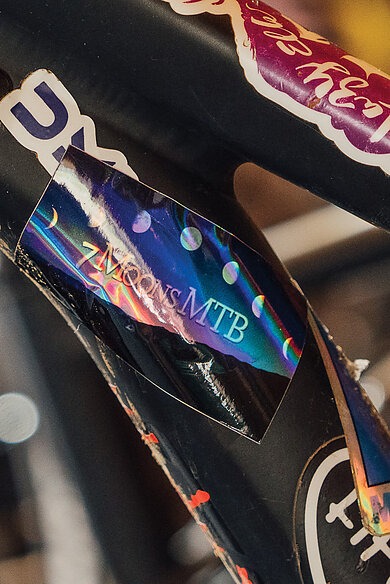
“I certainly admire her,” Larry says. “Growing up, we didn’t have the opportunity to engage our culture. Now she’s engaging as many people as possible. The Rezduro was an opportunity to talk about our culture. 7 Moons is now an opportunity to talk about our culture. She’s saying ‘We’re here, we’re a thriving, living community despite the obstacles of time, grief, and trauma.’ There’s a new opportunity to break that cycle and really enjoy who we are as Cherokee people.”
Laura says this ethos can be described as Gadugi, a Cherokee word that encompasses community in which its people share a vision “to help produce, to have a purpose, and to make sure that you help, maintain, and care for one another that way.” For Laura, giving became how she balanced herself on the right path. “Once all the principles are flowing and working together, you’re a complete person,” she says. “Being complete may lead to ripping down the trails at Fire Mountain.”
The mountains of western North Carolina have a habit of trapping storms, and on one recent day, snow clouds camped out at Soco Gap, leaving Fire Mountain cold but dry. Laura and her riding buddies sit together inside a shelter. Emra huddles beside Laura as the rest of the group readies their gear for the final descent to the parking lot. The Oconaluftee River shimmers below as it bends around the stores and houses of her homeland. Her bike, bejeweled with components made in these mountains, leans against her friend’s bikes in a hodgepodge of hardtails, cross-country race rigs, and sturdy daily drivers. Like Laura, most of the riders in Cherokee are new practitioners. The mountain bike community here is fresh, it’s eclectic, and it’s on fire—full of Gadugi.
The joy of ripping down a trail on a mountain bike is freedom in its simplest form. It is balancing a skillset against a set of obstacles in the present moment. It is an act of understanding the world, not controlling it.
For Laura, riding is not just an act of confronting the obstacles of time, grief, and trauma, it is the freedom to be a whole person. It is tearing down the barriers between her present and past. It is an act of denying anger of its power. It is ripping apart the removal of her ancestral suffering and replacing it with peace, place, purpose, and productivity.
Moving with nature is learning to speak an ancient language. With her voice and her actions, Laura is responding to her past to promote healing. She is inheriting the right path and passing it on to another generation of the Eastern Band of Cherokee Indians.
